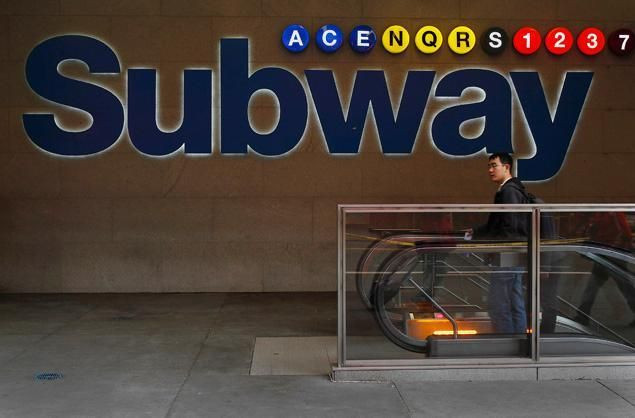MTA Approves Naming Rights Policy: NYC Subway Stations Can Be Renamed For Corporate Sponsors

The Metropolitan Transportation Authority is moving forward with a policy that allows it to rename New York City subway stations after corporate sponsors.
The policy, approved by the MTA board on Wednesday, outlines the eligibility guidelines for companies looking to stamp their brand names on subway stations, bus stops, rail stations or other facilities owed by the perennially cash-strapped transit agency.
A spokesperson for the MTA confirmed the policy’s approval on Thursday. The first-of-its-kind plan comes amid projected deficits of $240 million a year through 2016, and ongoing efforts to rein in what the MTA refers to as uncontrollable costs, such as pensions and employee health care.
While the policy is new, the idea of selling the naming rights to a New York City subway station is not without precedent. In 2009, three years before the opening of Brooklyn’s Barclays Center, the MTA sold the rights to the nearby Atlantic Avenue Station to Barclays PLC. The London-based bank agreed to pay $200,000 a year for 20 years.
In its policy statement, the MTA said it wanted to adopt effective procedures in “anticipation of future requests” for the renaming of MTA-owned facilities. The agency said it will only consider requests from sponsors with specific geographical ties to a facility that riders would recognize. It insists that riders will not be confused or disoriented by any name changes.
The eligibility guidelines for sponsors read as follows:
“Station names should be accurate and help orient customers as they navigate the MTA network. Recognizing the importance of ensuring that customers are able to navigate the system easily, requests for the Re-naming of a Facility will only be accepted from Sponsors with a unique or iconic geographic, historic or other connection to such Facility that would readily be apparent to typical MTA customers. An example would be a stop that is associated with a particular destination such that the vast majority of customers exiting at such station are headed to that destination. MTA will not consider Re-naming requests from third parties looking merely to brand a Facility in the absence of such a compelling nexus between the Facility and the Sponsor.”
The plan has received surprisingly little pushback for a city where residents are notoriously protective of their landmarks. In 2011, when the City Council agreed to rename the Queensboro Bridge after former Mayor Ed Koch, residents took to the streets and staged a musical protest, spoofing Simon and Garfunkel’s “59th Street Bridge Song.”
In response to the naming-rights policy, however, even riders advocates seem to be shrugging their shoulders. Some even think it might be a step in the right direction. Gene Russianoff, senior attorney for the Straphangers Campaign, said the policy could offer the MTA the chance to receive compensation for something it had been doing all along.
“The horse is already out of the barn on this,” he said in a phone interview. “There’s Times Square, Rockefeller Center, Yankee Stadium, Columbia University. The one thing they have in common is that the MTA didn’t get any money for the stations being named after those private entities.”
What’s more, Russianoff added, the policy will help ensure that whatever deals the MTA does make are worth making. The guidelines allow for the agency to hire an independent firm that provides valuations of naming rights, thereby ensuring that it’s getting “fair market value” for the stations it renames.
“When they did the Barclays-Atlantic Avenue Center, there were no rules,” he said. “When you consider all the millions of people who go through that station ever year, I think they got a lousy deal.”
Market value aside, the whole idea may still conjure up fears of a future subway announcer calling out “Next stop: Donald Trump Station.” But for now, that seems about as likely as a bus stop named after Anthony Weiner.
“The rules help determine what’s appropriate, and naming stations after people is not,” Russianoff said. “The MTA had nothing to do with the renaming of the Ed Koch Bridge, and I don’t think they particularly like it.”
Read the full policy below and decide for yourself.
Got a news tip? Send me an email. Follow me on Twitter: @christopherzara
© Copyright IBTimes 2024. All rights reserved.






















